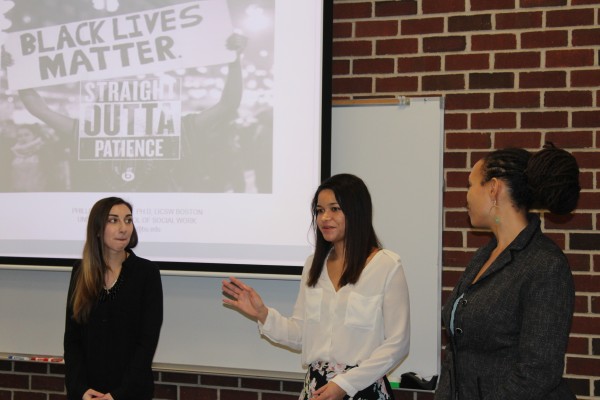GSS and Dorothy Day Sponsor Talk on Black Lives Matter
Members of the Dorothy Day Center for Service and Justice (DDCSJ) at a Saturday event that discussed the Black Lives Matter movement. (CONNOR MANNION/THE OBSERVER)
February 24, 2016
On Saturday, Feb. 20, the Dorothy Day Center for Social Justice (DDCSJ) and the Fordham Graduate School of Social Service (GSS) packed undergraduates, graduate students and community activists into the Lowenstein South Lounge in order to talk about the Black Lives Matter (BLM) movement, how it relates to the field of social work and how social work students can incorporate the lessons learned at the talk into their future careers.
The keynote speaker of the event was Phillipe Copeland, Ph.D., a clinical professor at Boston University who led a presentation on what the BLM movement was, beginning by asking the audience gathered how they defined the BLM movement. One response came from Maia Bedford, Fordham College at Lincoln Center (FCLC) ’16, who said, “I believe it is a movement to promote justice for black communities in the United States and globally. It also seeks to end the structural racism that is so prevalent in the western world.”
Copeland framed the conversation by referencing the freestyle rap performed by Kendrick Lamar at the Grammy Awards which made explicit references to Trayvon Martin. “When I think about the movement, I think of it as a marathon, and this is the latest leg of a marathon for freedom. We are at a particular stage where many of us are being ‘handed the baton’ in this marathon, so to speak,” he said.
Copeland said that the BLM movement is made up of three different overlapping circles. “When lives are lost, family friends and neighbors come together and organize … and they become what I call a committed core. But around these people are something called a community of concern.”
Copeland explained that this second level is made up of people “moved to fight for black lives in their particular arena. Beyond this are just people who don’t make the news, but are living Black Lives Matter.”
Also a part of the gathering was “a moment of healing” led by Anne Ortega-Williams LMSW, a Ph.D. candidate in GSS. “I think that when you have conversations like this, it is about creating the conditions for power … I can talk about Black Lives Matter, but healing is about knowing and realizing there is something I can do.”
Ortega-Williams encouraged future involvement: “Each of us have a chance to transform our situations. It has to be everyone at all times.”










